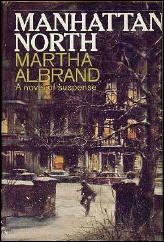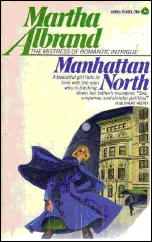Sat 16 Jul 2011
A 1001 MIDNIGHTS Review: MARTHA ALBRAND – Manhattan North.
Posted by Steve under 1001 Midnights , Reviews1 Comment
by Marcia Muller
MARTHA ALBRAND – Manhattan North. Coward McCann & Geoghegan, hardcover, 1971. Avon, paperback, 1973.

The cover of the paperback edition of this novel hails its author as “the mistress of romantic intrigue.” This is a blatant case of mislabeling, probably in an effort to take advantage of the great popularity of Gothic suspense novels in the early Seventies; and fans of that genre who bought this novel on the basis of the cover line must have been sorely disappointed.
Albrand’s work is suspenseful, but in a realistic, contemporary fashion. She deals with political and other problems of current concern (and in Manhattan North she is a good bit ahead of the times, writing of subjects that are frankly controversial), and her settings and characters are reflective of the world as we know it. True, she generally incorporates a love interest in her stories, but this does not always end on a happily-ever-after note.
Manhattan North begins with the fatal stabbing of Supreme Court Justice Clark Jamison Butworth, who has been found in a snowbank in Central Park. The killing of Butworth, a close adviser to the president, prompts the formation of a committee to “investigate the effect of violence on the judiciary and terror as a measure of influencing judicial decisions.”

Tad Wood, a young liberal lawyer, is asked to organize it, and facts soon emerge that begin to disturb him: The police investigation into Butworth’s death is being soft-pedaled, apparently on orders from the administration; there are irregularities about the death, such as the fact that Butworth was disguised in a wig and goatee at the time he was murdered.
Tad digs deeper, makes the acquaintance of Butworth’s daughter, and is on the scene to help her when she is attacked by a burglar. Or was it a simple case of burglary?
As Tad investigates, his personal life also plagues him. His godfather’s daughter, Lindy, has been sent abroad quite suddenly, and he receives an urgent plea from her for help. A psychic he has consulted about the Butworth case turns up dead, an apparent suicide.
This is an engrossing novel that takes a hard look at some of the stickiest issues confronting contemporary society. Albrand’s early work also concerned itself with current issues, such as her two novels of the wartime Dutch Underground, No Surrender (1942) and Without Orders (1943). A later novel, A Call from Austria (1963), takes up the theme of escaped Nazi war criminals, and Zurich AZ/900 (1974) is a novel of international medical intrigue.
———
Reprinted with permission from 1001 Midnights, edited by Bill Pronzini & Marcia Muller and published by The Battered Silicon Dispatch Box, 2007. Copyright © 1986, 2007 by the Pronzini-Muller Family Trust.
July 16th, 2011 at 10:48 pm
I feel good that I was able to come up with a scan of the paperback edition of MANHATTAN NORTH that Marcia referred to at the top of her review.
Avon published three or four, and maybe as as many as six of Albrand’s books in this same pictorial format, which I find appealing, even though it mighth have points out.
I’ve accumulated several of Albrand’s novels in paperback over the years, but I’ve never gotten around to reading one.
I suppose I ought to do something about that, but that’s probably only wishful thinking.